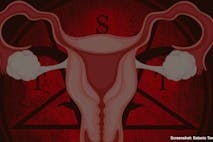
Missouri's Prison Nursery Program 'changes lives' of moms and their babies
Bridget Sielicki
·
Pop Culture
Cassy Cooke
·
Human Interest
Lisa Bast
·
Analysis
Nancy Flanders
·
International
Cassy Cooke
·
Analysis
Nancy Flanders
·
400k+ Readers Strong & Growing
News & Commentary from
A Pro-Life Perspective
As the news arm of Live Action, we educate the public and advocate for preborn rights by providing timely, accurate, and compelling news and stories about the pro-life movement.

Pop Culture
Cassy Cooke
·
Human Interest
Lisa Bast
·
Analysis
Nancy Flanders
·
International
Cassy Cooke
·
Analysis
Nancy Flanders
·
Politics
Bridget Sielicki
·
Guest Column
Mark Lee Dickson
·
Human Interest
Isabella Childs
·
Activism
Bridget Sielicki
·
Analysis
Cassy Cooke
·
Guest Column
Michael J. New
·
Analysis
Carole Novielli
·